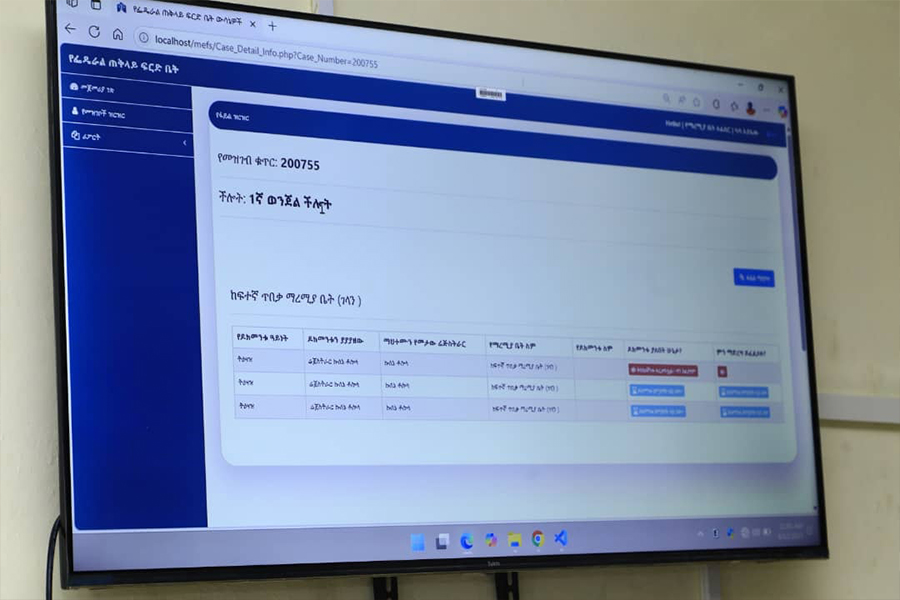
Fortune News | Feb 06,2024
The Ethiopian Ministry of Health (MoH) has made a significant move toward improving healthcare by launching the country’s first-ever National Patient Safety Guideline (NPSG). This guideline aims to address growing concerns around the safety and quality of care in the country's healthcare facilities. It’s a step meant to elevate patient care standards and reduce the alarming rate of harm many patients face.
The statistics are sobering. In Ethiopia, 10pc of patients encounter safety hazards while receiving medical care, with a 2pc mortality rate linked to these issues. Globally, over 3 million lives are lost each year due to preventable medical errors. The World Health Organization (WHO) estimates that one in ten patients worldwide suffers harm in healthcare settings, and in primary care alone, four in 100 patients are affected.
Among the most common and dangerous risks are medication errors, surgical and diagnostic mistakes, unsafe blood transfusions, and healthcare-associated infections. These are issues that can result in long-term harm or even death.
A recent tragedy underscores just how urgent these improvements are. A doctor lost his life due to a preventable error during a routine surgical procedure. What was supposed to be a minor surgery turned into a nightmare when anaesthesia complications led to a severe reaction. The patient was transferred to another hospital, but despite desperate efforts, including attempts at dialysis, he passed away on September 15.
His grieving family is left not only heartbroken but also disillusioned with the healthcare system. They face the painful task of explaining the loss to his young children, including a three-year-old daughter. This tragic case is just one of many, reflecting the dire need for enhanced patient safety measures in Ethiopia.
Mihret Abate, a technical assistant at the Institute for Healthcare Improvement (IHI), worked alongside MoH and WHO to develop the NPSG, the first in the country. According to her, the quality of healthcare services depends on a well-structured system, which many local institutions lack. The IHI has trained over 3,700 healthcare providers to improve safety standards, yet challenges like poor communication, insufficient training, and a lack of coordination persist.
To address these challenges, the new guideline provides a roadmap for healthcare providers to follow, complementing their existing skills and ethical practices. It is designed to help prevent errors, improve diagnostic accuracy, and ensure that healthcare services are delivered safely and efficiently.
Some hospitals are already leading the way in patient safety. St. Paul Hospital Millennium Medical College has implemented innovative programs to improve care. The hospital designates a "focal person" in each department responsible for patient safety and even appoints long-term patients as "ambassador patients" to share feedback on their care experiences.
According to Abdu Adem (MD), the hospital’s quality director, St. Paul Hospital takes patient input seriously, giving the example of one patient’s suggestion which led to the creation of an operating room checkpoint, providing vital information to patients about their procedures and medications. The hospital also focuses on health literacy, educating both patients and healthcare providers about safety measures, which are all grounded in evidence-based practices.
One of the largest in the country, the Hospital has a capacity of 700 beds and serves 2,500 to 3,000 patients daily. The institution actively engages in research endeavours, leveraging insights to drive improvements in care even outside its jurisdiction. Notably, such initiatives led to the establishment of a maternal surgical unit surgery area at a Hani Dima healthcare facility in Burayu, reducing the need for referrals to St Paul.
However, Abdu acknowledges that challenges remain. The hospital still faces a shortage of trained personnel, lacks basic equipment like incinerators for waste management, and struggles with space and construction delays. These are problems that need to be addressed for Ethiopia’s healthcare system to improve.
Markos Feleke (MD), president of the Ethiopian Health Care Federation, emphasized the importance of setting and adhering to minimum standards for patient care. "The 2012 healthcare facility construction standards established minimum requirements, but not many hospitals have been built since." he said.
Markos believes that accreditation and strict adherence to these guidelines are essential to eliminating medical errors.
He also highlights patient misidentification as a key issue in the Ethiopian healthcare system. Many hospitals lack proper identification systems, which can lead to critical mistakes. Ensuring that hospitals meet minimum requirements is vital for enhancing patient safety.
Eyobed Kaleb, officer of patient safety at MoH, acknowledges that previous initiatives like safe childbirth checklists and system bottleneck reforms have made a difference, but they lacked comprehensive guidelines. The new initiative aims to fill that gap by providing clear protocols to protect both patients and healthcare providers.
Wongel Tena (MD), an assistant professor at Jimma University, also stresses the importance of communication between patients and caregivers. Clear communication about medical conditions, treatment options, and procedures is crucial for patient empowerment, yet it’s often overlooked. She calls for a stronger focus on incident reporting, so that medical errors can be used as learning opportunities rather than simply brushed under the rug.
Wongel stresses that while the guideline is a crucial step forward, rigorous implementation, ongoing patient education campaigns, and greater transparency will be key to making Ethiopian healthcare safer for everyone.
This new framework is intended not just to protect patients, but also to empower healthcare providers to report errors in a blame-free culture—an essential step in creating a healthcare environment focused on learning, safety, and continuous improvement.
Eyobed adds that "this guideline will not only aid to safeguard patients but also help health care providers increase their knowledge."
PUBLISHED ON
Oct 06,2024 [ VOL
25 , NO
1275]

Fortune News | Feb 06,2024

Commentaries | Oct 26,2024

Radar | Jun 25,2022

Radar | Nov 09,2019

Fortune News | Jul 23,2022

Radar | Sep 29,2024

Radar | Sep 27,2025

Fortune News | Jul 19,2025

Radar | Jul 07,2024

Fortune News | Sep 14,2019

Dec 22 , 2024 . By TIZITA SHEWAFERAW
Charged with transforming colossal state-owned enterprises into modern and competitiv...

Aug 18 , 2024 . By AKSAH ITALO
Although predictable Yonas Zerihun's job in the ride-hailing service is not immune to...

Jul 28 , 2024 . By TIZITA SHEWAFERAW
Unhabitual, perhaps too many, Samuel Gebreyohannes, 38, used to occasionally enjoy a couple of beers at breakfast. However, he recently swit...

Jul 13 , 2024 . By AKSAH ITALO
Investors who rely on tractors, trucks, and field vehicles for commuting, transporting commodities, and f...

Oct 18 , 2025
The political establishment, notably the ruling party and its top brass, has become p...

Oct 11 , 2025
Ladislas Farago, a roving Associated Press (AP) correspondent, arrived in Ethiopia in...

Oct 4 , 2025
Eyob Tekalegn (PhD) had been in the Governor's chair for only weeks when, on Septembe...

Sep 27 , 2025
Four years into an experiment with “shock therapy” in education, the national moo...